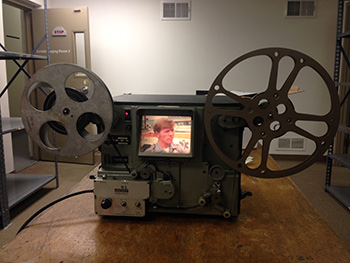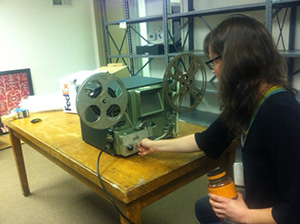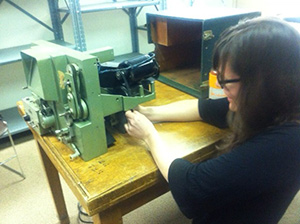Story
History Colorado Reels into the Future
Last month, History Colorado’s Photography & Moving Image department received an extraordinarily generous donation: this 1950s-era Moviola LV film editor.
Originally developed for film editors, the Moviola machine allowed viewers to watch film advance on a small screen and to stop, fast-forward, or reverse it at multiple speeds. Editors could thus determine exactly the right point to make cuts. Our Moviola will have a much simpler purpose. It lets staff watch 8mm and 16mm film reels in the collection in order to catalog and make accessible the undiscovered portions of History Colorado’s moving image collection.
This boxy piece of machinery might look outdated, but it’s a crucial step towards History Colorado’s being able to open up its moving image collection to researchers. Since the early twentieth century, we’ve assembled a small collection of television news footage, home movies, and films by early Colorado production companies, dating from the early 1900s through the 1980s. But use of the moving image collection is currently very limited, as the collection has never been fully cataloged. We must also address preservation and copyright concerns before researchers can fully access the collection. To get there, the Moviola is the first piece on a short list of equipment the Photography & Moving Image department needs.
The donor of the Moviola is award-winning producer and director Thomas G. Miller. Tom has been doing research this winter in the History Colorado moving image collection for his forthcoming documentary, Limited Partnership. His film tells a little-known story from the American gay rights movement, a story centered right here in Colorado. In 1975, a county clerk in Boulder issued marriage licenses to six gay couples, including Richard Adams and Anthony “Tony” Sullivan. Following their marriage, Richard and Tony petitioned the U.S. Immigration and Naturalization Service for resident status for Tony, an Australian citizen. But their petition was denied based on their sexuality because, as the U.S. government informed them, it had not been established that a marital relationship could truly exist between two gay men. Richard and Tony sued to prevent Tony’s deportation – thus filing the first federal lawsuit seeking equal treatment for a same-sex marriage in U.S. history.
While assisting Tom with his research for Limited Partnership, staff were able to use existing inventories to find several reels of television news footage that appeared to relate to Richard and Tony’s wedding. However, we quickly realized that we had no way to view the 16mm film to verify that the footage was actually on the reels. Enter Tom and his production company, Tesseract Films, who went above and beyond to locate and ship the Moviola to History Colorado.
Last week, Photo Archivist Emily Moazami and I started learning the ins and outs (literally) of the Moviola. Our first attempt to play a reel of 16mm film on the machine ended with us scratching our heads in dismay: though the motor chugged loudly, the reel failed to advance. We flipped switches, checked fuses, and loaded and reloaded the reel, all to no avail. Finally, with some trepidation, we decided to think “inside the box” – and pulled off the exterior case for a look at the Moviola’s innards. And there we found the problems: a slipped belt and a motor that had jostled loose from its footings. One screwdriver, two greasy hands, and several high-fives later, the Moviola was running like a dream. And we sat down to proudly watch our first films reel by on the tiny screen.
This will be the first of many uses the Moviola will likely get. Beginning this summer, we plan to launch a multi-year project to catalog the treasures in the moving image collection. Watch for these records to appear in History Colorado’s library catalog by winter 2015. Eventually, we also hope that, with the help of grant funding, we can even digitize selected films and make them available online. With many, many thanks to Tom Miller, the Moviola brings us one step closer to being able to begin this important project.
In the meantime, we’re still missing several pieces of crucial equipment necessary for us to catalog, repair, and make accessible History Colorado’s moving image collection. These include:
- 8mm, 16mm, and 35mm footage counters
- 8mm, 16mm, and 35mm split reels
- 8mm and 16mm tabletop film viewers with sound readers
- Portable rewind bench
Do you have any of these things lying around in your attic or garage? Would you like to donate them to History Colorado? If so, please contact curator@state.co.us.
All inquiries about the moving image collection and how to access it should be directed to the Stephen H. Hart Library & Research Center at cosearch@state.co.us.



